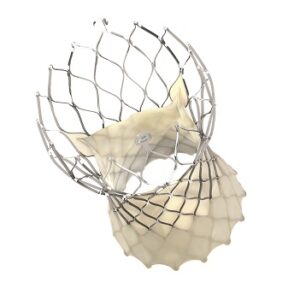
Medtronic has announced new data for the Evolut transcatheter aortic valve implantation (TAVI) system, presented at PCR London Valves 2024 (24–26 November, London, UK).
New findings from the Optimize PRO clinical study demonstrated favourable procedural and clinical outcomes following use of an optimised care pathway and the cusp overlap technique (COT) to deploy Evolut valves. Additionally, a pooled analysis of Evolut PRO patients was shared showing improvement in rates of paravalvular leak (PVL) in TAVI patients, over time following hospital discharge.
Full 30-day findings from the Optimize PRO global study show utilisation of the cusp overlap technique with the Evolut PRO and PRO+ devices led to favourable procedural and clinical outcomes. Findings of the multicentre, postmarket, prospective study conducted in 50 centres globally demonstrated low rates of new 30-day permanent pacemaker implantation (6.4% with cusp overlap technique compliance) and no moderate or severe aortic regurgitation at discharge.
The Optimize PRO clinical study evaluated valve performance and procedural outcomes associated with an “optimised” pre- and post-procedural TAVI care pathway, utilising the cusp overlap technique to deploy the Evolut valves. The cusp overlap technique is designed to help implanters assess and achieve the optimal implant depth to reduce interaction with the conduction system. At 30 days, the primary endpoint of all-cause mortality or all stroke was 5.1%, all-cause mortality 0.8%, disabling stroke 1.7%, and cardiovascular rehospitalization was 5.7%.
“We are encouraged by this data as it demonstrates significant positive outcomes when leveraging the cusp overlap technique with the Evolut valve,” said Steven J Yakubov (OhioHealth Riverside Methodist Hospital, Columbus, USA), co-principal investigator of the Optimize PRO global study. “The new results support a standardised protocol that will help support early hospital discharge and lower rates of complications for our patients, improving their quality of life.”
Additionally, paired analysis assessed improvement in PVL over time post-TAVI with the Evolut PRO valve in patients with symptomatic, severe aortic stenosis. The study analysed core lab echocardiographic data from 620 patients treated with Evolut PRO from the prospective Evolut Low Risk Trial, FORWARD PRO study, and Evolut PRO US study. The analysis demonstrated improvements in severity of PVL after 30 days post-hospital discharge to three-year follow-up.
From the paired analysis of patients with available data at all follow-up visits, the PVL severity for 30 days post-hospital discharge was 60.8% none/trace, 36.0% mild, 2.9% moderate, and 0.3% severe. At three-year follow-up, the PVL severity was 79.8% none/trace, 19.6% mild, 0.6% moderate and 0.0% severe. The occurrence of worsened PVL from discharge/30 days to three-year follow-up was uncommon.
“This analysis expands upon previous studies and found a majority of patients classified with mild or greater PVL improved in their PVL severity at three years,” said Nicolas Van Mieghem (Thoraxcenter, Erasmus University Medical Center, Rotterdam, The Netherlands) lead investigator in the study. “This study will help inform physicians on the treatment of this complication post-TAVI.”
“With the Evolut TAVI system, we are committed to improving outcomes for patients while maintaining exceptional safety and efficiency,” said Nina Goodheart, senior vice president and president of the Structural Heart & Aortic business, which is part of the Cardiovascular Portfolio at Medtronic. “The data presented at London Valves 2024 further establishes Medtronic and Evolut as leaders in the supporting and sharing the robust clinical evidence physicians need to make the best decisions for their patients when choosing and performing TAVI.”










